Photographic Memory
Like many Jews in this post-Holocaust world, I have very weak ties to my family’s history.
I know the basic story of my family’s immigration to America. My grandmother was born into a large Jewish family in Lodz, Poland. When the Nazis invaded in 1939, the whole family was forced out of their home and shipped off to ghettos and later, concentration camps, with the lone exception of my grandmother and my two great aunts. My grandmother’s parents arranged for her to be taken in by a gentile family. She was only six years old at the time.
After a few years of hiding, she got word that her Aunt Rose was still alive under a false identity in a neighboring town. She left her neighbors who had bravely sheltered her, and by some miracle managed to find Rose. With forged documents, the pair escaped to Vienna, Austria, where they stayed until the war ended. Eventually, they journeyed through Ellis Island to start their new life in New York City.
It’s an unbelievable story, especially as it’s only validated by an oral history and a receipt of my grandmother’s boat ticket from Austria to the US. Records like those are the little discoveries my family clings to, remnants of the past that reaffirm our history and resilience.
But the gradual revelations of my family’s past were my parents’ obsession, not mine. I never paid much attention to our history when I was younger. I felt very disconnected from my Jewish past, as I had little grasp of what the Holocaust really was and what it meant to be Jewish, especially growing up in an area with few Jews. I couldn’t grasp the full meaning of my Jewish identity, so I was indifferent towards it.
One day, when I was maybe eleven or twelve, my mother showed me an old photograph of my ancestors from the 1920s, a photo she recovered from Aunt Rose’s New York apartment after she died in the early 2000s. It was a family portrait depicting two women, a man, and five children. It would have been an unremarkable picture to me, but one of the children looked exactly like me. She was my great-grandmother.
We have the same eyes, same mouth with the downturned edges, same full face, and the widow’s peak that my mother and I also share. It was bizarre to see something as familiar as my own face mirrored in this foreign image of 20th century European stoicism, wearing dark, formal clothes with capped sleeves and intricate updos.
Stranger still was that someone of my near-exact likeness had lived, grown up, had a family, and died. My mind reeled with the implications of the fact that the girl in the portrait was a full-blooded human with consciousness and not a black-and-white representation of my ancestry.
I still think about my great-grandmother, though in different contexts as the years pass. Initially she was stuck in my head as the haunting image of a child, but now I can imagine her to look something like the present version of myself. A young woman, with her own mind, probably thinking about marriage and starting a family.
My great-grandmother didn’t know she would die prematurely, among masses, immortalized as a statistic, and recognized generations later as a little girl in an old photo, never able to finish her life to the extent that she deserved. Though I never knew her, I inherited her face. This undeniable connection between us compels me to live and do great things for the life she only partially lived. I am committed to social justice and repairing the world for her life, and for the lives of people all around the world who are threatened by prejudice and inequity.
I owe it to that photograph for making me care about my Judaism. So much of our culture is ingrained in history and in recovering family ties, because we’ve had thousands of years of erasure and separation from our ancestral roots. Seeing my face in a photograph from almost a century ago was an awakening. At some point in time, my blood was there, in the thick of one of the darkest times of history.
I want to honor that presence, to continue my Jewish studies and path of social justice. It is my tribute to them.
This piece was written as part of JWA’s Rising Voices Fellowship.

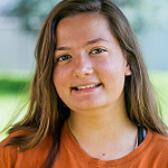
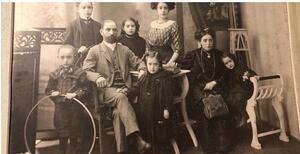
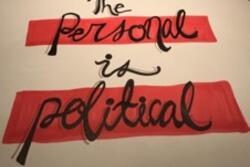
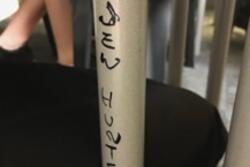
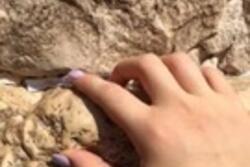


This is wild!
Wow!